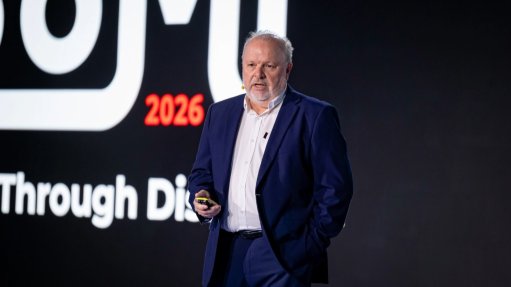Company offers solutions for safer work-at-height practices
Solar system installations in South Africa must prioritise safety and proper planning, with height works specialist Height Safe 360 emphasising that training is an imperative to ensure implementation of the right fall protection plan and the choice of suitable access solutions.
This will assist in enabling the industry to continue to grow sustainably and safely, while safeguarding the well-being workers, Height Safe 360 director Johan du Toit says.
With the current rate of solar system installations in South Africa, he notes that the focus is on generating electricity quickly, which often means that planning for future access and maintenance is neglected.
This approach poses safety risks and liability concerns for homeowners, he says, suggesting that to address these issues, proper training, equipment and planning are essential. If not done properly, it could lead to potential risks and difficulties in maintaining the systems effectively, he warns.
For example, the steep pitch of most urban house roofs increases the risk of falls for solar installers, creating a liability concern for homeowners. Some roofs may be too close to the ground, making standard fall arrest systems inadequate, and the fall clearance needs to be properly calculated and considered, Du Toit says.
Considering that the height of some roofs might be close to the ground, Du Toit says that despite use of the typical full body harness with shock absorbing lanyard a person might fall off the roof and still hit the ground if the fall clearance has not been properly calculated.
It is suggested that a different type of fall arrest system be used to ensure that a safe fall clearance is maintained, he says.
Metal sheet roofs in industrial settings, meanwhile, “can be deceiving”, as they may not be designed to withstand heavy traffic. “Falling off the roof is not the real threat, it is falling through the roof owing to roof sheeting collapse or tear,” Du Toit says.
“Untrained personnel walking on these roofs can pose significant safety risks,” Du Toit warns.
To combat these risks, Height Safe 360 offers comprehensive solutions to equip solar installers with the necessary skills, knowledge and equipment to carry out their work efficiently and safely.
To ensure that solar installers are well-prepared and properly trained, Height Safe 360 offers sector education and training authority- (Seta-) accredited training, with an Institute for Working at Height (IWH) licence specifically tailored for the solar sector.
This includes training on manual handling, basic and advanced fall arrest techniques, and anchor point and anchor line installations for the Heightsafety line product range, and more.
Height Safe 360 also offers a comprehensive range of fall arrest, rope access, and rope rescue equipment suitable for solar installers. This includes personal fall protection gear such as the Alumax basic fall arrest harness with double shock absorbing lanyard and various options for temporary and permanent anchor lines.
These courses and patents were designed and developed by the company over the past 23 years to make general working at height safer, more cost effective and easily accessible to the general user.
“We are possibly the only company in South Africa that manufactures its own range of fall arrest and rope access products (not just harnesses and lanyards) and that offers the training, design and installation of fall arrest systems,” Du Toit says.
He adds that through the company’s broad operation experience, it can understand clients’ working conditions and requirements, adding that through the company’s hands-on training, “we can ensure greater competence at height, that will increase confidence and productivity in the workplace”.
Implementing Common Safety Measures
For any work at height, a well-thought-out fall protection plan is essential, Du Toit says.
“This plan should include a rescue plan in case of emergencies, certified and suitable fall arrest equipment for specific work applications, and competent staff with IWH licences for working at height,” he notes, highlighting that the choice between temporary and permanent access solutions depends on factors such as frequency of access, risk assessment and cost considerations.
Each option has its pros and cons, but the goal should always be to reduce risks and ensure worker safety, he adds.
He further avers that all personal fall arrest equipment and/or temporary anchor systems must be inspected every time before use and urges workers to “check your weather report and know your working area to avoid working in severe weather conditions”.
Further, addressing potential challenges in implementing temporary work-at-height systems requires a systematic approach and careful consideration of all factors.
Essential steps to ensure successful implementation include proper prior planning and risk assessment, comprehensive training, and orientation, selecting the right equipment and testing the rescue plan.
Article Enquiry
Email Article
Save Article
Feedback
To advertise email advertising@creamermedia.co.za or click here
Press Office
Announcements
What's On
Subscribe to improve your user experience...
Option 1 (equivalent of R125 a month):
Receive a weekly copy of Creamer Media's Engineering News & Mining Weekly magazine
(print copy for those in South Africa and e-magazine for those outside of South Africa)
Receive daily email newsletters
Access to full search results
Access archive of magazine back copies
Access to Projects in Progress
Access to ONE Research Report of your choice in PDF format
Option 2 (equivalent of R375 a month):
All benefits from Option 1
PLUS
Access to Creamer Media's Research Channel Africa for ALL Research Reports, in PDF format, on various industrial and mining sectors
including Electricity; Water; Energy Transition; Hydrogen; Roads, Rail and Ports; Coal; Gold; Platinum; Battery Metals; etc.
Already a subscriber?
Forgotten your password?
Receive weekly copy of Creamer Media's Engineering News & Mining Weekly magazine (print copy for those in South Africa and e-magazine for those outside of South Africa)
➕
Recieve daily email newsletters
➕
Access to full search results
➕
Access archive of magazine back copies
➕
Access to Projects in Progress
➕
Access to ONE Research Report of your choice in PDF format
RESEARCH CHANNEL AFRICA
R4500 (equivalent of R375 a month)
SUBSCRIBEAll benefits from Option 1
➕
Access to Creamer Media's Research Channel Africa for ALL Research Reports on various industrial and mining sectors, in PDF format, including on:
Electricity
➕
Water
➕
Energy Transition
➕
Hydrogen
➕
Roads, Rail and Ports
➕
Coal
➕
Gold
➕
Platinum
➕
Battery Metals
➕
etc.
Receive all benefits from Option 1 or Option 2 delivered to numerous people at your company
➕
Multiple User names and Passwords for simultaneous log-ins
➕
Intranet integration access to all in your organisation


















